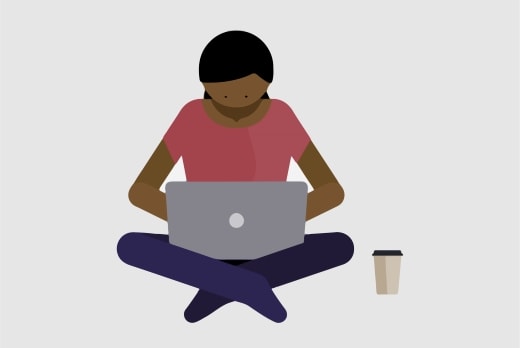Updated: Apr 11, 2023

Peer pressure is often associated with the middle or high school years, but it doesn't necessarily go away once you outgrow your teens. And it doesn't just affect the decisions you make about what to wear, who to hang out with, or how to act, either.
Financial peer pressure can have a huge influence on what you do with your money. For previous generations it was all about "keeping up with the Joneses." For millennials and Gen Z, it's the fear of missing out that results in pressure to spend.
From a financial perspective, the FOMO effect driven by social media is a recipe for disaster. About 40% of young adults admit to overspending—even going into debt—to keep up with their friends and share it on social media. Needless to say, that can make budgeting in your 20s, and managing personal finances, a challenge.
"Financial issues often start in college, as most young adults haven't figured out their relationship with money," says Jessica Cline, a financial therapist. "It's natural to want to fit in with your friends and engage in the same lifestyle choices, but your spending has to be congruent with your values."
Your spending also has to fit with your income otherwise you could end up living beyond your means. Following the crowd can be particularly dangerous for new graduates who may be leaving school with student loan debt. If you're just starting your career, and have debt, your salary may not leave much wiggle room for extra spending.
Learning how to overcome financial peer pressure is essential for managing personal finances successfully in your 20s and beyond.
Let your budget be your spending guide
Living on a budget is often equated with having zero fun with your money. That's a misconception, says David Cahill, founder of personal finance blog FinanceSuperhero.
"A budget actually helps provide the financial freedom many people feel it takes away," he says. Echoing Cline, Cahill advises creating a budget that's in tune with your personal values, which "will help you consistently spend your hard-earned money with a purpose."
Creating your first budget isn't difficult. It simply involves adding up your monthly expenses and subtracting that total from your monthly income. Ideally, you want to have money left over each month that can go toward repaying debt, savings, or another financial goal. And of course, you want to leave a little something extra for having fun.
Daniella Flores, who authors the finance blog ILIKETODABBLE, acknowledges that budgeting in your 20s can take some getting used to. Flores only began taking her finances seriously when she was 27. Learning to budget was a critical step.
"As we get older, we don't want money to run our lives, so we learn to manage it in a way to live life on our terms," Flores says. "Saying yes and no to certain things is a part of that financial management."
That doesn't mean fun with friends has to disappear entirely. But you may need to focus more on finding inexpensive things to do so your budget isn't strained.
Establish financial boundaries with friends
Setting boundaries is important in any relationship for building trust and mutual understanding. It's particularly important if you're sensitive to financial peer pressure.
"When you give in to the peer pressure of purchases when your friends are around, indirectly you begin to make those same financially irresponsible decisions when they're not around," says Isaac M. Cooper, CEO and managing partner of IMC Financial Consulting in Birmingham, Alabama. This, Cooper says, lessens your ability to become financially independent.
Engaging in regular discussions with your friends about managing personal finances is something to consider as you work towards being financially healthy, without giving in to peer pressure.
"Having a healthy relationship with money isn't just about having a savings account and paying your bills," Cline says. "It requires vulnerability and openness and it's your responsibility to create a relationship with your friends in which you feel comfortable saying no."
While you don't have to share all your financial details with your friends, be open about your goals and your challenges. If they're planning an activity that's out of your budget range, don't be afraid to suggest other inexpensive things to do. And consider carefully whether to maintain a friendship when your boundaries are frequently tested.
"Realize that as your priorities and goals change over time, your inner circle of friends may need to change too," Cahill says. "A friend who cannot understand, support, and respect your financial goals may not be worth keeping around."
Remember who's truly in control
As you navigate budgeting in your 20s, remember that you're ultimately in charge of when and how you spend.
Cooper admits that budgeting can seem like a simple task but highlights the importance of controlling the emotion behind each purchase or financial decision. Otherwise, your budget can easily get derailed.
Understanding why you make the money choices you do can help keep peer pressure-driven spending at bay. Use a budgeting app to keep track of spending and a notebook to record how you felt when making each purchase.
Review your spending log to look for patterns. Are you more likely to overspend with friends when you're tired or stressed? Are you overspending on smaller things, like ordering dessert after you've already hit your spending budget for dinner, or larger things, such as a pricey vacation?
Studying the patterns can help you spot the triggers that lead to overspending.
"Your financial situation is yours and not your friend's," Flores says, "and that means taking responsibility for your actions."
The early bird gets the worm
If you recently graduated, you may still be getting your bearings, but make learning to budget a top priority. Brainstorm ideas for fun but still inexpensive things to do to keep spending in check. Create a plan for repaying student loans if you're leaving school with debt. Add saving for emergencies and retirement—even if it's only in small amounts—into your budget once you've gotten your first job.
When peer pressure kicks in, remember that it's okay to say no to overspending. In doing so, you're saying yes to improving your financial health.






